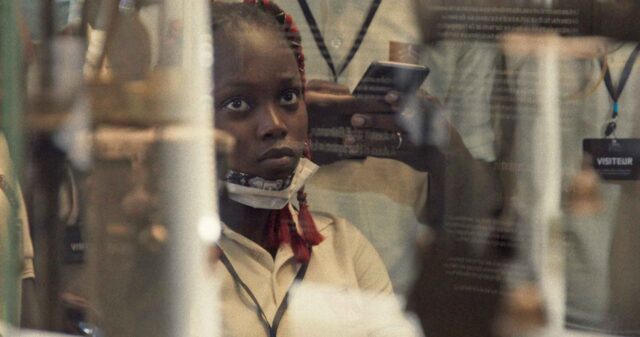Mati Diop’s new documentary, Dahomey, is a dreamy little piece of observation, quietly brimming with old-school Negritude and faith in the power of objects. Her ostensible protagonists are not people, African or otherwise — they’re a set of 26 ancient Dahomian “treasures,” art pieces and artifacts, that French President Emmanuel Macron decided to repatriate to Benin in 2021. Most of her short film — 68 minutes — follows the objects themselves as they are handled gingerly by museum professionals, carefully packed for shipping, and then carefully unpacked and indexed back “home.” We tour the otherwise empty ship, and get three different shots of the hold’s dehumidifier. Diop even drops in melodramatic narrative voices for the figures and totems during the voyage: They wonder why it’s so dark inside their crates, and speculate about finally being back where they belong.
Her first feature since 2019’s rather startling magical-neo-colonial melodrama, Atlantics, Diop’s doc leaves much unsaid for most of the film. We see little of Benin outside of the new museum’s palatial gardens and lawns, which are tended by tireless workers and guarded by soldiers with AKs. Colonial-era cultural ransacking was, and is, bad, we know, but the film does not provide much context, and virtually no history. The focus on the objects, and the conceit that they have post-colonial feelings of their own, ends up feeling negligible — as if they’re more important than the actual people who suffered under French colonial exploitation, of whom we hear nothing at all.
We do hear a few descriptions of the individual artifacts, and hints of a pre-colonial history of tribal warfare and inequity, but they’re spare and glancing. The textual void encourages you to notice that Diop is a bit of a tourist here herself, Paris-born and half-Senegalese. (Even if you start at Dakar, a flight to Benin passes over four other countries and covers nearly 1,200 miles, more than the distance from Paris to Lviv; they’re not neighbors.) You come away, for most of the film’s duration, with less of a notion of the kingdom of Dahomey (which, by the way, was a rather militaristic empire in its own right and thrived by conquering neighbors and selling slaves to Europeans), but with more respect for the diligence and care of museum workers.
In the final chunk, Diop films a colloquy of dozens of passionate Beninian students, arguing about the importance of the artifacts, how funding should be allocated so that schoolchildren can visit them, how “the soul” of their country may or may not reside within them, and how the thousands of other artifacts still residing in French museums might make Macron’s gesture almost insulting. You can draw your own conclusions — about how these young Africans seem savvy about some things and naive about others, at least — because Diop draws none. Meanwhile, they’re all speaking French, and the lawns are as green as any Florida golf course.
Dahomey is playing at the Roxie Cinema, 3125 16th Street, starting Nov. 8.




